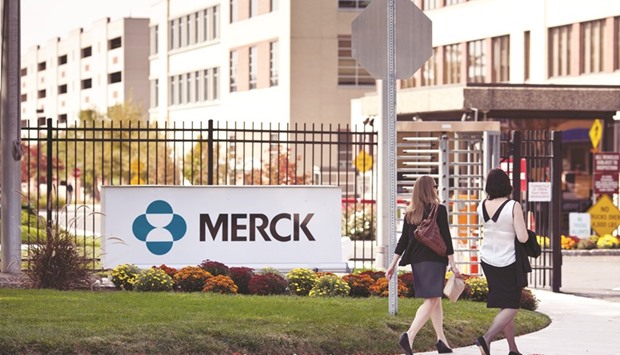Lung cancer treatment is moving beyond chemotherapy, with Merck & Co setting the pace in a new category of therapies that harness the body’s immune system to fight tumours.
The US drugmaker’s Keytruda medicine reduced the risk of death or cancer progression by 50%, Merck said, unveiling details of a crucial study at a meeting of the European Society for Medical Oncology. The medicine gave patients an average of 10.3 months before their cancer progressed, compared with six months on chemotherapy. Unlike competitor Bristol-Myers Squibb Co, whose similar drug Opdivo failed in an advanced trial and caused its stock to plunge, Merck selected patients who harboured high levels of a protein thought to predict how well the immune-system drugs will work.
The results give Merck a head start – and not just on Bristol-Myers. Roche Holding and AstraZeneca are also in the race for the best new immune therapy against lung tumors, the most common cancer in the world. While Merck and Bristol-Myers are the leaders, each of the four companies will probably be able to take a piece of the market as data emerges from single and combination therapies for patients with various levels of the predictive protein, said Mirjam Heeb, who helps manage $186mn in healthcare stocks, including Bristol- Myers, Roche and Merck, at GAM Holding in Zurich.
“We can assume now that Merck has a lead of at least 12 months” in its target patient group, Heeb said in a telephone interview. “But the overall landscape is changing so fast that I think it’s impossible to predict what it will look like in 12 months.”
Doctors will probably start testing patients soon after diagnosis to see whether they’re suited to treatment with Keytruda and can forgo the many side effects of chemotherapy, said Stefan Zimmermann, a chief oncologist at the Cantonal Hospital of Fribourg, Switzerland.
“The main reaction will actually be relief and renewed hope,” Zimmermann said on Sunday from the meeting in Copenhagen. “We have been waiting for ways to ditch the good old chemotherapy that carries significant toxicity.”
Shares of Merck, which have gained 19% this year, rose 3% in trading before the opening of US markets, while Bristol-Myers fell 6.1%, adding to a 19% decline this year. AstraZeneca fell 0.4% in London, and Roche rose 0.4% in Zurich.
The US Food and Drug Administration is set to decide by December 24 whether Keytruda, already approved for patients whose lung cancer got worse after chemotherapy, can be used as an initial treatment too. Some 224,000 Americans will probably be diagnosed with lung tumours this year, according to the National Cancer Institute. Much of the battle for dominance in lung immune-oncology drugs thus far has centred on whether patients need to show high levels of a protein called PD-L1 to benefit. Merck’s trial focused on patients whose tumours expressed PD-L1 at least half the time.
That group could comprise as many as one-quarter of newly-diagnosed lung-cancer patients, said Sam Fazeli, an analyst with Bloomberg Intelligence. By contrast, Bristol-Myers’s competing therapy, Opdivo, failed a test as a sole treatment for lung cancer after the company included patients with lower levels of PD-L1. But details of the trial unveiled at the conference pointed to lacklustre results even in a narrower group of patients with high PD-L1 levels.
“PD-L1 assessment has to be part of the standard diagnostic workup,” said Corey Langer, director of the thoracic oncology programme at the Abramson Cancer Center at the University of Pennsylvania. “Patients can’t wait for these results.”
Langer led a smaller trial of Merck’s Keytruda also presented in Copenhagen, which combined the drug with chemotherapy and also let in all patients, no matter their PD-L1 levels. The combination was almost twice as successful at shrinking lung cancer tumours than a standard chemotherapy regimen. But with just 123 patients, the trial was too small to say for sure whether the combination is better than immune therapy alone, Langer said.
Roche also presented results showing its immune therapy contender, Tecentriq, helped patients whose lung tumours had already progressed. Tecentriq was approved by regulators in May for advanced bladder cancer, and Roche expects a ruling from the FDA in second-line lung cancer by the end of next week. Results for newly-diagnosed patients aren’t expected before 2018, however.
By then, Fazeli said, investors will be focusing on combination therapies. The first results from two immune therapies used together will probably come next year from AstraZeneca. Bristol-Myers is also working on such a combination, with data due out in 2018.
Like Merck, Roche is combining its immune-oncology drug with chemotherapy, aiming for approval in 2018.

Pedestrians walk outside a Merck facility in New Jersey. Lung cancer treatment is moving beyond chemotherapy, with Merck setting the pace in a new category of therapies that harness the body’s immune system to fight tumours.
